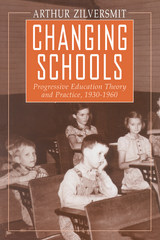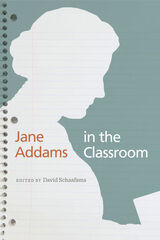
Through a focus on actual classroom practices in several school systems in the Chicago area, Zilversmit examines the impact of Dewey's ideas at a national and local level. He looks at the course of progressivism from the 1930s, when its influence was at its height but reform was difficult because of the Depression, through the post-World War II period when the baby boom led to rapid school expansion. The new affluence made reform possible, but the Cold War put progressivism on the defensive.
Zilversmit's goal is to illuminate the role of the ideas of the progressives in determining school practices so we can develop a better understanding of the relationship between education ideas and educational practices. This understanding, argues Zilversmit, will better enable us to determine new directions for educational reform, and to determine how reforms can be successfully implemented.

Balancing theoretical and practical considerations, the collection examines Addams's emphasis on listening to and learning from those around her and encourages contemporary educators to connect with students through innovative projects and teaching methods. In the first essays, Addams scholars lay out how her narratives drew on experience, history, and story to explicate theories she intended as guides to practice. Six teacher-scholars then establish Addams's ongoing relevance by connecting her principles to exciting events in their own classrooms. An examination of the Jane Addams Children's Book Award and a fictional essay on Addams's work and ideas round out the volume.
Accessible and wide-ranging, Jane Addams in the Classroom offers inspiration for educators while adding to the ongoing reconsideration of Addams's contributions to American thought.
Contributors include Todd DeStigter, Lanette Grate, Susan Griffith, Lisa Junkin, Jennifer Krikava, Lisa Lee, Petra Munro, Bridget O'Rourke, David Schaafsma, Beth Steffen, Darren Tuggle, Erin Vail, and Ruth Vinz.

John Dewey’s Educational Philosophy in International Perspective brings together eleven experts from around the globe to examine the international legacy of the famous philosopher. Placing special emphasis on Dewey’s theories of education, Larry A. Hickman and Giuseppe Spadafora have gathered some of the world’s most noted scholars of educational philosophy to present a thorough exploration of Dewey’s enduring relevance and potential as a tool for change in twenty-first-century political and social institutions.
This collection offers close examinations of the global impact of Dewey’s philosophies, both in his time and our own. Included are discussions of his reception as a much-respected yet criticized philosopher among European Catholics both before and after World War I; the utilization of his pragmatic theories in Italian education and the continuing quest to reinterpret them; his emergence as a source of inspiration to new democracies in Central and Eastern Europe; and his recently renewed popularity in the Hispanic world, particularly in South America and Spain. In addition, authors delve into Dewey’s notion of democracy as a personal way of life and his views on the important ties between education and the democratic state.
Also discussed are Dewey’s philosophies regarding school and society, including the understanding of educational trends as reflections of their social context; the contrast between his methods of applying intelligence to ethical problems and the theory of orthodox utilitarianism; responses to criticisms of Dewey’s controversial belief that the sciences can be applied directly to educational practices; and incisive queries into how he would have responded to the crucial role the Internet now plays in primary and secondary education.
This well-rounded volume provides international insight into Dewey’s philosophies and contains a wealth of information never before published in English, resulting in an indispensable resource for anyone interested in John Dewey and his lasting role in education around the world.
Contributors
Viviana Burza
Franco Cambi
Giorgio Chiosso
Jim Garrison
Jaime Nubiola
Hilary Putnam
Ruth Anna Putnam
Giuseppe Spadafora
Emil Višnovský
Leonard J. Waks
Krystyna Wilkoszewska

In March 1933, Nazi storm troopers seized control of the Odenwaldschule, a small German boarding school near Heidelberg. Founded in 1910 by educational reformer Paul Geheeb, the Odenwaldschule was a crown jewel of the progressive education movement, renowned for its emancipatory pedagogical innovations and sweeping curricular reforms. In the tumultuous year that followed that fateful spring, Geheeb moved from an initial effort to accommodate Nazi reforms to an active opposition to the Third Reich’s transformation of the school. Convinced at last that humanistic education was all but impossible under the new regime, he emigrated to Switzerland in March 1934. There he opened a new school, the Ecole d’Humanité, which became a haven for children escaping the horrors of World War II.
In this intimate chronicle of the collision between a progressive educator and fascist ideology during Hitler’s rise to power, Dennis Shirley explores how Nazi school reforms catalyzed Geheeb’s alienation from the regime and galvanized his determination to close the school and leave Germany. Drawing on a wealth of unpublished documents, such as Geheeb’s exhaustive correspondence with government officials and transcripts of combative faculty meetings, Shirley is able to reconstruct in detail the entire drama as it unfolded. Others have examined the intellectual antecedents of Nazism and the regime’s success at developing themes from popular culture for its political purposes; Shirley goes further by analyzing the many ways in which German educators could and did respond to Nazi reforms. In the process he identifies the myriad forces that led individuals to accept or resist the regime’s transformation of education.
The Politics of Progressive Education offers a richly rewarding examination of how education in general, and progressive education in particular, fared in the turbulent political currents of Nazi Germany. It brings to light a remarkable story, hitherto untold, of one individual’s successful attempt to uphold humanistic values in the darkest of circumstances.
READERS
Browse our collection.
PUBLISHERS
See BiblioVault's publisher services.
STUDENT SERVICES
Files for college accessibility offices.
UChicago Accessibility Resources
home | accessibility | search | about | contact us
BiblioVault ® 2001 - 2024
The University of Chicago Press









